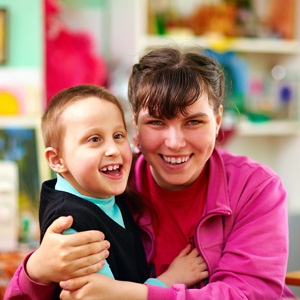
Preschoolers with special needs benefit from going to school with children who have strong language skills, according to a new study.
Classmates with higher-level language abilities promote language growth in children with disabilities, researchers found. On the other hand, development of language could be delayed if their classmates have weak language skills, they said.
Read: Childhood educators hold key to kids' verbal skills
"We were surprised to see the striking differences among children's language skills at the end of the school year when considering those with less-skilled peers and highly skilled peers," said the study's lead author, Laura Justice, psychological scientist with the Crane Centre for Early Childhood Research and Policy at Ohio State University in Columbus. "In particular, children with disabilities seemed to be very negatively affected by having classmates who were less skilled."
The researchers said the findings, published in Psychological Science, support the concept of inclusion – including children of varying abilities in a classroom.
Assessing language skills in disabled children
The study involved 670 preschoolers. More than 50 percent of the children were diagnosed with a disability, such as autism spectrum disorder, language impairment or Down syndrome.
At the beginning of the school year, teachers assessed the children's language skills. Their development was reassessed at the end of the year to determine how much their abilities improved. The researchers also compared each child's end-of-year score with the classroom average.
Read: Autism and language impairment genetically linked
Preschoolers with special needs were more affected by their classmates' language skills than the kids who did not have a disability, the study revealed. By the end of the school year, the special needs children in class with other children with weak language skills lagged well behind their normally developing peers.
In contrast, the preschoolers who had weak language skills when the school year began had greater improvements throughout the year if their classmates had strong language skills. The researchers pointed out these kids had scores similar to highly skilled students who had less-skilled peers.
Kids imitate each other
When kids are in a classroom together, they naturally imitate each other's behaviour, the researchers explained. This encourages the development of language skills, such as waiting to speak, communicating needs and storytelling.
Read: Babies use specific brain areas to imitate people
"If peer effects operate as our work suggests they do, it is very important to consider how to organise children in classrooms so that their opportunities to learn from one another is maximised and so that young children with disabilities are not segregated into classrooms serving only those with special needs," Justice said in a journal news release.
Since the language skills of normally developing children continue to improve regardless of the abilities of their classmates, the researchers concluded school officials should strive to fill classrooms with students of various skill levels.
Read more:
Fun activities boost language learning
Quality programmes key to autistic preschoolers
Image: Disabled child from Shutterstock




 Publications
Publications
 Partners
Partners














